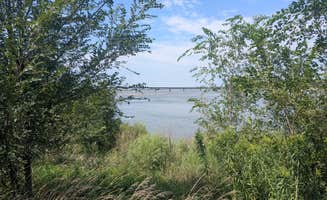Dispersed camping near North Sioux City, South Dakota primarily centers on wildlife management areas along the Missouri River corridor. The region sits at the junction of Nebraska, South Dakota, and Iowa, with camping sites positioned on the Nebraska side of the river. Most primitive camping locations require traveling maintained gravel roads that can become rutted during wet weather conditions.
What to do
River access: Mulberry Bend Wildlife Management Area provides a boat ramp for fishing and water recreation on the Missouri River. "Not too far down a gravel road. Great views and breeze of the Missouri River," notes Jessica K. in her review of the area.
Wildlife observation: The management areas near North Sioux City serve their primary purpose as wildlife habitat. Seasonal hunting regulations may affect camping availability and require awareness of hunting seasons before planning overnight stays.
Supply runs: For campers needing provisions during their stay at primitive sites, urban conveniences remain accessible. According to Travis A. at Mulberry Bend Wildlife Management Area, "Walmart is 5.3 miles away," making supply runs relatively convenient from this remote location.
What campers like
Uncrowded environment: The dispersed camping options near North Sioux City tend to have minimal overnight visitors despite daytime activity. "This was a fine location. A few people stopped by the boat ramp but no one else stayed the night," writes Lynn about her experience at Mulberry Bend.
Spacious parking area: Despite being a primitive site, the boat launch area provides adequate space for multiple vehicles. Travis A. observes that Mulberry Bend has "enough room for 6 or 7 rigs" making it suitable for small groups camping together.
Accessibility for various vehicles: The gravel access roads remain passable for different vehicle types including those pulling trailers. Rick M. confirms this stating, "No problem at all getting my bus in here," regarding his visit to Wiseman Wildlife Management Area.
What you should know
Conflicting reports on access: Some campers report occasional closures or access issues. Jessica K. initially reported, "This is now closed off w a fence," but later updated with, "Not too far down a gravel road. Great views and breeze of the Missouri River."
Limited facilities: While some primitive sites offer basic amenities, others provide no facilities whatsoever. Rick M. notes, "There are trash cans and if you can do water procurement, there's the Missouri River. I don't see a grey dump though."
Ambiguous camping regulations: Several campers note uncertainty about official camping policies. Dennis N. observed at Mulberry Bend, "Well from where I come from this is considered a boat landing not a camping spot still going to Camp here," reflecting the informal nature of these dispersed sites.
Tips for camping with families
Prepare for insects: The riverside location means significant insect activity during warm months. Bring appropriate repellents and protective clothing, especially for children who may be more sensitive to bites.
Water safety precautions: The Missouri River current can be swift and unpredictable. Families should maintain constant supervision of children near the water and consider life jackets for all water activities.
Consider alternative accommodations: Some families might find the primitive nature of these sites challenging. Dennis N. acknowledges the limitations stating, "It is a nice spot right on the river looks like there's spots you could put a tent I'm driving an RV."
Tips from RVers
Limited site development: RVers should expect truly primitive conditions with no hookups. Travis A. describes his experience: "I tow a 20ft trailer Next to Vermilliom river. 1 picnic table, pit toilet, boat ramp. Easy to get to. Well maintained gravel road. No potable water."
Size restrictions: Larger motorhomes and fifth wheels may find turning space limited. The boat ramp area can accommodate several vehicles but is not designed specifically for RV camping.
Water procurement challenges: RVers requiring water must plan ahead. Though the Missouri River provides water access, Rick M. points out this requires "water procurement" skills and equipment to make river water usable.


